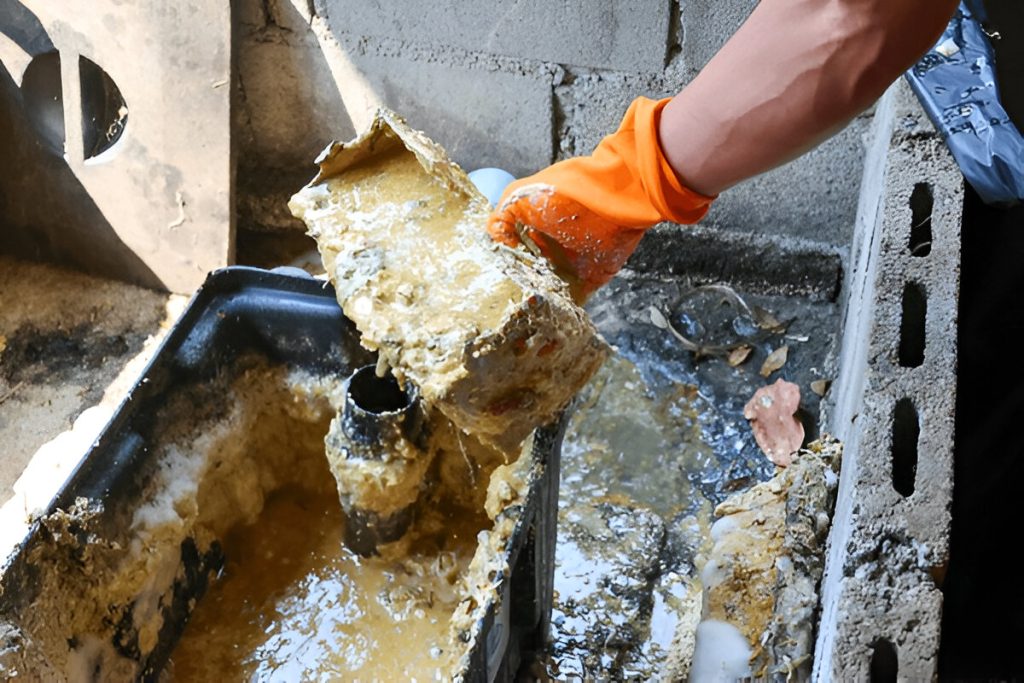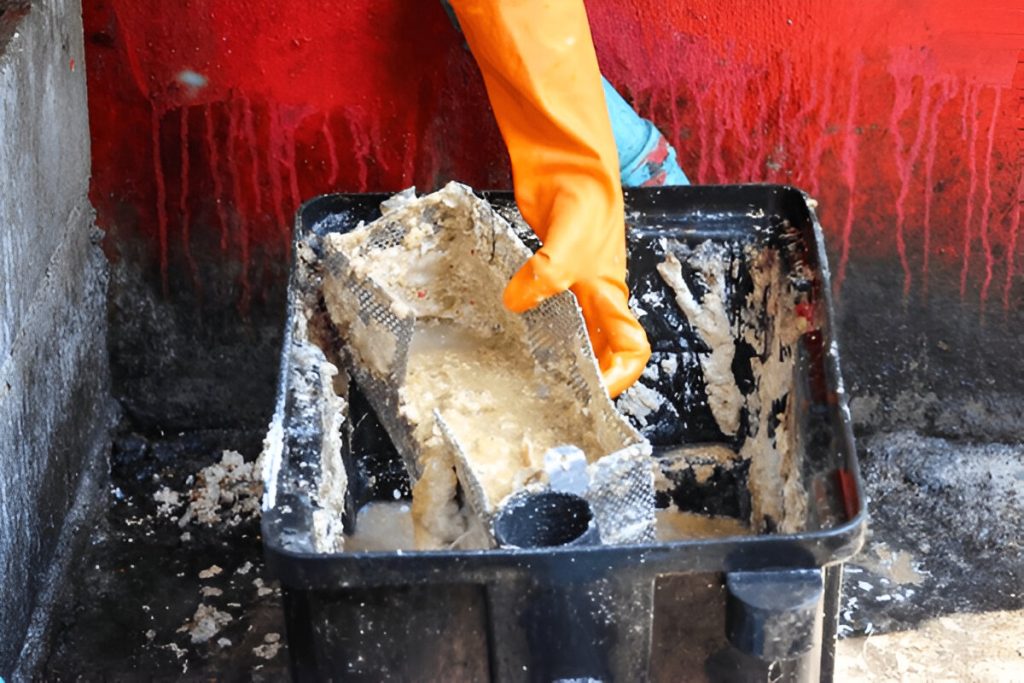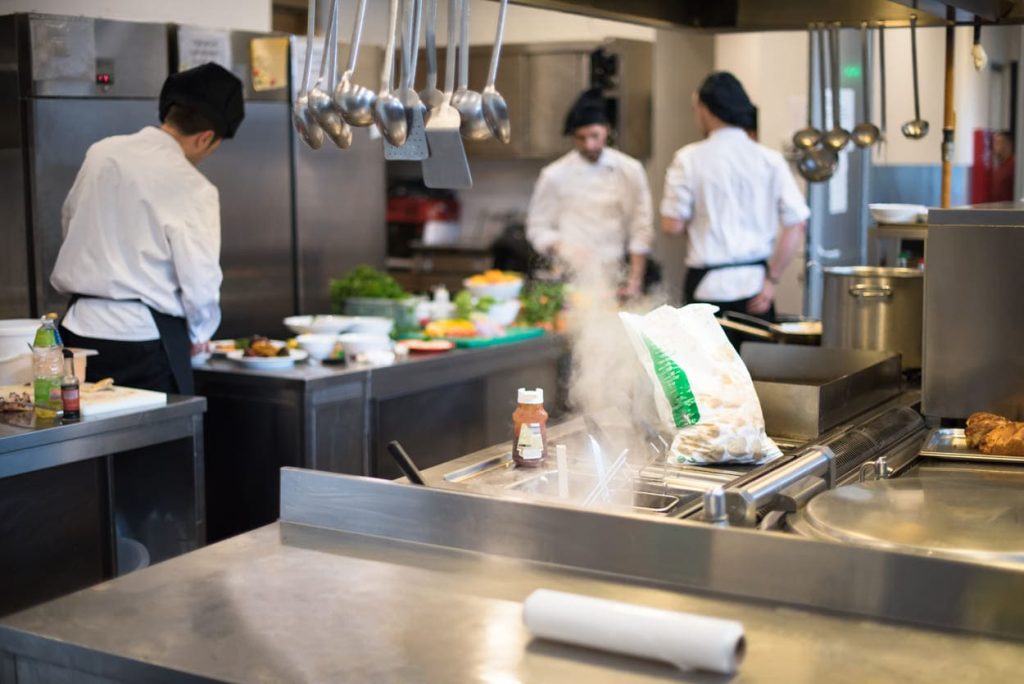Chicago Hood Cleaning
Grease Trap Cleaning in Newark, IL
Rated 5 stars on Google

Grease Trap Cleaning Solutions for Your Kitchen
Grease traps can cause big problems when they aren’t cleaned regularly. We help business owners in [location] avoid these grease trap headaches.
Foul Smells in Your Kitchen
Old grease smells awful. Nasty smells can be caused by your grease trap, and they need to be cleaned.
Clogged Drains
A clogged grease trap can cause your kitchen sinks to drain slowly or even back up. Slow drains are a common problem caused by a full grease trap.
Potential Fines and Violations
Grease trap problems can lead to health code violations. If yours is full or leaking, you could face fines or even be shut down.
Grease Spills into Your Kitchen
Overflowing grease traps lead to dangerous, slippery floors. It’s not just dirty—it’s a safety hazard.
Expensive Plumbing Repairs
Clogs caused by grease buildup are expensive to fix. Ignoring your grease trap cleaning now could cost you big on repairs later.
Unhappy Staff or Customers
No one wants to work—or eat—near bad smells and dirty drains. With regular cleaning, your kitchen stays a more comfortable place for employees and customers alike.
Why Choose Us for Vent Hood Cleaning in Newark

Experienced Professionals
We’ve been in the business for years, offering expert grease trap cleaning services. Our team is highly trained to handle grease buildup and prevent common kitchen issues, ensuring your kitchen stays clean and operational.

Health Code
Compliant
We ensure your grease traps are up to code. Regular cleaning prevents violations and fines, so you can avoid costly problems and keep your kitchen in top shape for health inspections.

Prompt and Reliable Service
We understand the importance of keeping your kitchen running smoothly. That's why we offer fast, reliable grease trap cleaning services that won’t disrupt your business. We'll work around your schedule to minimize downtime.

Grease Trap Cleaning Solutions for Your Newark Kitchen
As a business owner, you rely on your kitchen to run smoothly. But there’s one part of your kitchen that can easily be overlooked—the grease trap. Ignoring grease trap maintenance can lead to big headaches.
What is Involved in Grease Trap Cleaning?
Grease trap cleaning involves removing the buildup of grease and food waste from your kitchen’s grease trap. This is an essential maintenance task that keeps your kitchen running efficiently, prevents odors, and ensures that your kitchen is safe and up to code.
Why Grease Trap Cleaning is So Powerful
When you don’t clean your grease trap, it can create bigger problems. Regular cleaning helps avoid costly repairs and ensures your kitchen meets health and safety standards.
Problems You Can Solve with Grease Trap Cleaning in Newark
When you don’t clean your grease trap, it can lead to several problems:
Foul Kitchen Smells – Full grease traps stink up your kitchen and even the dining area.
Clogged Drains – A clogged grease trap can cause your drains to slow down or back up.
Health Department Issues – Inspectors check grease traps, and neglecting it can lead to violations. Dirty grease traps can cause fines or a failed health inspection.
Grease Overflow – Overflowing grease traps create dangerous messes. It’s hard to clean up, and it can be a safety hazard.
Plumbing Problems – Grease buildup leads to clogs in your main line. If grease keeps building up, it can lead to expensive plumbing repairs and even shut down your kitchen temporarily.
Unhappy Staff and Customers – A greasy kitchen is unappealing to both staff and customers. Cleaning your grease trap ensures a healthier, safer, and more pleasant work environment.
The Solution is Simple
Our professional grease trap cleaning service in Newark helps you avoid these issues and keep your kitchen in top condition. We clean your entire system, ensuring your business is safe, compliant, and ready for anything. Contact us for hassle-free, professional grease trap cleaning!

We Proudly Serve in Newark
Located in Kendall County, Illinois, Newark is a charming city with a rich history dating back to the early 1800s. Originally settled by European immigrants, Newark has grown into a thriving community known for its small-town atmosphere and friendly residents.
Those who call Newark home can enjoy a high quality of life, with access to excellent schools, parks, and local businesses. The city’s peaceful surroundings and close-knit community make it a great place to raise a family or retire in comfort.
In addition to its welcoming atmosphere, Newark offers a variety of amenities and points of interest for residents and visitors alike. Outdoor enthusiasts can explore the nearby Fox River or visit the beautiful Silver Springs State Park. History buffs will appreciate the Newark Lime Kiln, a historic landmark that offers a glimpse into the city’s past.
We would like to take this opportunity to thank the residents of Newark for their continued support and business over the years. We are proud to serve this wonderful community and look forward to providing top-notch grease trap cleaning services for many years to come.
Frequently Asked Questions
Grease trap cleaning is the process of removing built-up grease, food particles, and waste from your grease trap. This helps keep your kitchen’s plumbing system running smoothly, prevents bad odors, and ensures that your business is up to code.
The frequency of cleaning depends on the size of your kitchen and how much grease is used. Generally, it’s recommended to clean your grease trap every 1-3 months. Regular cleaning prevents overflow and keeps your kitchen running efficiently.
Regular grease trap cleaning prevents costly plumbing problems, bad odors, and health code violations. It also helps your kitchen stay sanitary and safe for both employees and customers. A clean grease trap ensures your business operates smoothly.
Neglecting grease trap cleaning can lead to foul odors, slow or clogged drains, plumbing backups, and even health code violations. It can also create an unhygienic environment, affecting both staff and customers.
The cleaning process typically takes 1-2 hours, depending on the size and condition of the grease trap. We work efficiently to minimize downtime for your kitchen and ensure everything is cleaned properly.
The cost of cleaning your grease trap varies based on the size and condition of the trap. However, regular cleaning is more affordable than dealing with plumbing repairs, health code violations, or a broken-down kitchen.
While it’s possible to clean your grease trap yourself, it’s best left to professionals. Our team has the experience and equipment to safely and thoroughly clean your grease trap, ensuring it’s done right and meets all local codes.
